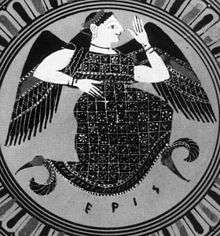Definify.com
Definition 2026
Eris
Eris
English

Eris
Proper noun
Eris
- (Greek mythology) The goddess of discord, confusion, and strife, keeper of the golden Apple of Discord which she threw into the wedding of Peleus and Thetis starting the Trojan War; daughter of Nyx, sister and constant companion of Ares, mother of Lethe.
- (astronomy) The largest known dwarf planet in the Solar System (initially dubbed the "tenth planet"), officially known as 136199 Eris, with one natural satellite, Dysnomia.
Derived terms
Translations
Greek goddess of chaos
dwarf planet
Synonyms
- (astronomy): 136199 Eris , (136199) Eris , 2003 UB313 , (136199) 2003 UB313 , 136199 Eris (2003 UB313) , Xena
Derived terms
- (astronomy): Eris I , Eris I Dysnomia (the moon of Eris, Dysnomia)
See also
- (dwarf planets of the Solar System) dwarf planets of the Solar System; Ceres, Orcus, Pluto, Salacia, Varuna, Haumea, Quaoar, Makemake, 2007 OR10, Eris, Sedna
- (mythology): Discordia
- (astronomy): Dysnomia
Anagrams
Albanian
Etymology
From erë 'wind', probably contaminated with Greek ἔρις (éris, “strife”).
Proper noun
Eris m
- A male given name
Related terms
eris
eris
Latin
Pronunciation
- (Classical) IPA(key): /ˈeː.ris/, [ˈeː.rɪs]
Noun
ēris
- genitive singular of ēr
Etymology 2
Verb
eris
- second-person singular future active indicative of sum
- "you will be"
Descendants
- Spanish: eres
References
- ERIS in Charles du Fresne du Cange’s Glossarium Mediæ et Infimæ Latinitatis (augmented edition, 1883–1887)
- Félix Gaffiot (1934), “eris”, in Dictionnaire Illustré Latin-Français, Paris: Hachette.
- Meissner, Carl; Auden, Henry William (1894) Latin Phrase-Book, London: Macmillan and Co.
-
(ambiguous) putting aside, except: cum discessi, -eris, -eritis ab
-
(ambiguous) putting aside, except: cum discessi, -eris, -eritis ab
- eris in The Perseus Project (1999) Perseus Encyclopedia
- eris in Harry Thurston Peck, editor (1898) Harper's Dictionary of Classical Antiquities, New York: Harper & Brothers
- eris in William Smith, editor (1848) A Dictionary of Greek Biography and Mythology, London: John Murray